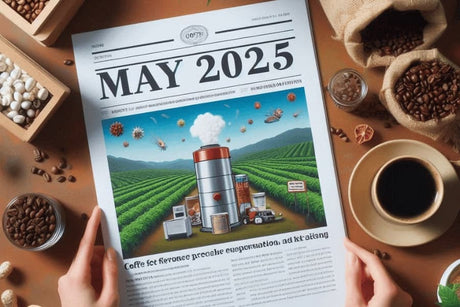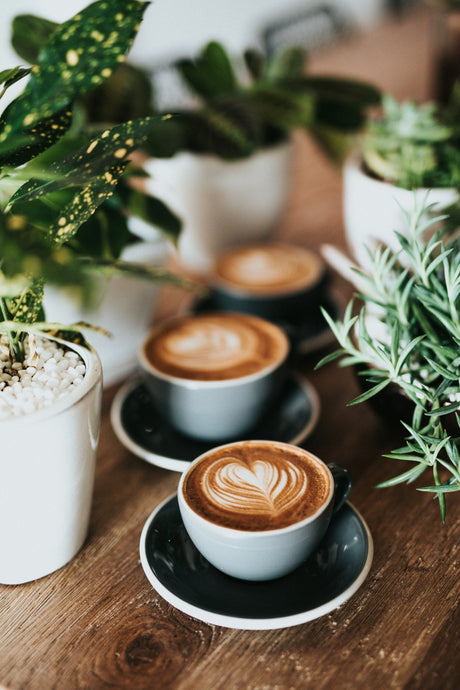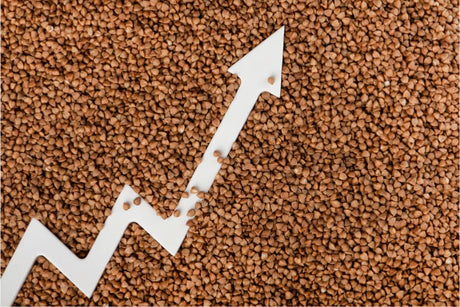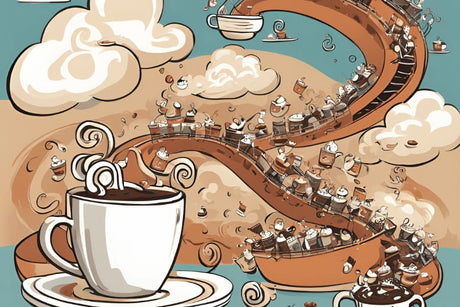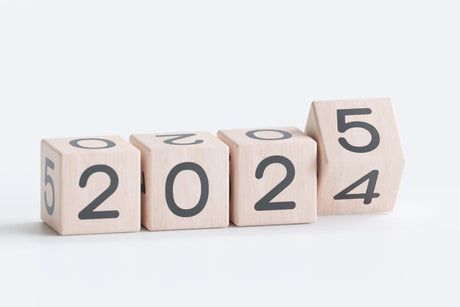“When we are no longer able to change a situation - we are challenged to change ourselves.” — Viktor E. Frankl
mycuppa February 2020 Newsletter
This month, we have quite a few updates to communicate.
Pricing of our 500g packs will rise over the coming month. Most 1kg packs will remain the same except FAIRTRADE due to the increasing costs of compliance, and single origins will be assessed on a case-by-case basis subject to supply conditions remaining stable.
We are also planning to adjust the price of grinding as it's proving to be far too challenging to provide the grind-on-demand across more than 400 coffees each day and still meet our rapid pick, pack and dispatch targets.
Minor adjustments will occur to freight as suppliers push through their annual increases - we have been absorbing the fuel surcharge for around ten months now, and it's become too expensive to keep subsidizing this cost.
From February, we are introducing an Extreme Heat Policy - holding back the sending of parcels on those days in summer when it's ridiculously hot.
Our new 1kg bags are making an appearance in Feb. This bag has around 40% less plastics compared to the previous custom bag as we shift our consumables towards more eco-friendly materials.
February's Secret Label is just divine - a pairing of two origins that work so beautifully together. Rich, lush, silky smooth with that winning trifecta of nuts, caramel and dark chocolate - a real flavour powerhouse.

A delightful surprise that will steal your heart and have you coming back for more.
There are two origins that are perfectly paired with our Australian palate of milk-based espresso - often regarded as a match made in coffee heaven.
Silky smooth, rich and syrupy, with goopy dollops of juicy tangerine and nectarine fruits and a wonderful array of nuts, caramel and dark chocolate to finish - a winning trifecta of taste.
Balanced to a T and a serious flavour powerhouse.
We really don't need to say anything else, just delicious.
For a limited time only - ending before the end of the month.
New 1kg bags
Our new 1kg bags will start appearing in February.
We mentioned a couple of months ago our commitment to reducing plastics used in the construction of coffee packaging, and our new bags are a big leap forward in meeting this objective.
Gone are the internal zips - these features were problematic in so many ways.
Excessive plastics and glues were used to construct our zip-bag; the bags also needed to be larger (more materials used, hence more plastics); they are also a lot more difficult to use in the production process to open, fill and seal, harder to handle when having to grind sealed packs, etc. In summary, the custom gusset bag with an internal zip has been a royal PITA.
Ironically, the zip features don't help prevent the roasted coffee from staling - never have and never will.
Zips offer almost zero protection to preserve the freshness of roasted coffee, so it's just a deceptive marketing gimmick (or I should say a short-term convenience feature) that we, along with the entire coffee industry, got bullied into providing by consumers years ago when everyone didn't fully understand the facts about differences between active compounds in fresh roasted coffee versus the majority of stable, passive food ingredients.
In other words, fresh roasted coffee is remarkably different, and hence, you can't treat it the same as most other ingredients.
During the second half of 2020, we begin testing the next generation of eco-bags. We will point out, though, that these materials need to actually work properly and aid in preserving product quality.
You see, there is so much smoke and mirrors about eco-packaging that the world has gone bonkers jumping on bandwagons built from untested and unproven science.
It's called hysteria and cashing in on marketing with deceptive claims to naive consumers.
If you receive a bag of coffee that appears cosmetically different to what's shown on the website, please don't panic; there's a transition period, and we simply don't have the time to precisely coordinate our high-speed production processes with the significant efforts required to update websites.
It's still the same great coffee, just different packaging.

We have always acted transparently in our business by practising full disclosure.
Last month, we flagged some changes coming to our pricing soon.
Firstly, our 500g bags will increase in price, which will also flow through to some 1kg packs depending upon the stability of the raw coffee market prices, which have risen by close to 30% in the last two months.
FAIRTRADE coffees will rise as the cost of compliance continues to increase, and the sourcing of raw coffees is considerably more expensive, given the premium placed on these lots.
Some single origins will rise depending upon the dynamics of supply and demand - you must remember that coffee prices swing wildly every day and change rapidly.
It should be around mid-February when the changes apply.
Except for a few origins in recent years, such as Kenya, Sumatra and just a few weeks ago, Ethiopia Yirgacheffe (a direct result of shortages till May), our coffee prices have remained stable and super-competitive for many years despite significant increases in gas, packaging, logistics, compliance and general overheads.
It is called price deflation, whereby our costs increase, and our selling prices remain flat. And it's dangerous territory for companies, often leading to failure or collapse if not managed properly - you only need to look at the string of retail closures in the last few months - all due to protracted periods of severe margin squeeze.
The reason 500g packs are rising is simple - 500g packs have always been more expensive to produce - the bags are close to the exact cost as the 1kg bags.
Due to the bag's construction, we have to pack these on a particular machine by hand, so it's a lot slower and more labour-intensive.
The fact smaller portion sizes are more expensive should come as no surprise as it's the brutal reality of smaller packaging like every other manufacturing industry.
GRINDING COFFEE BEANS
Also increasing is the price of grinding coffee.
We've been subtly dropping hints on the "pains" around grinding for a while now....... The reality is that grinding has been killing us.
Offering an a-la-carte grind-on-demand service for freshly roasted packs of whole bean coffees, particularly in the short few hours we have to process orders each afternoon, is incredibly challenging.
At mycuppa, we have never stocked ground coffee and never will.
All our coffees are packaged as whole beans, which involves manually handling each ground order by hand.
We wrote about the cost of grinding coffee more than two years ago - it's close to 3 times what we charged back then.
You may have also noticed that often when we introduce a new feature coffee, it may have yet to have ground options available.
Despite having a collection of large commercial grinders (each calibrated to a single grind type) running hard every afternoon for many hours trying to keep up with the ground orders, it's impacting our ability to process orders fast.
Unfortunately, we have attracted an unfair proportion of ground coffee orders daily. Once upon a time, it was more manageable at around 5%, but these days, it's up about 20 - 30%, which becomes a mighty challenge to process daily.
Installing more grinders and hiring more staff is not the solution.
Each pack must be manually opened, ground, cleaned, and sealed - all by hand, taking hours each afternoon causing our teams to rush through orders with far higher risks of accidental mistakes.
It's also ridiculous of us to offer 42 different coffees, each available in 2 pack sizes and five grind combinations, within just a few short hours each day to prepare orders for dispatch - that's 420 unique offerings.
Ultimately, we keep returning to our original advice - customers should consider that pre-grinded coffee degrades rapidly from the moment it's ground. Even inside a sealed bag, it's going stale fast, regardless of how fresh the coffee was when it left our premises.
For those who love their coffee, grinding the beans just before brewing is the only way to consume coffee at its best. Pre-ground coffee could be a better compromise.
SHIPPINGFreight providers generally increase their rates by up to 5% annually.
It's never a general increase as they may bump up some zones higher and others lower or unchanged. Still, you can always count on the overall result being an increase, and it's the same trend for packaging and additional costs like insurance, etc.
In January 2020, AusPost slapped a hefty new surcharge on Express services - called a "Security Surcharge". It's costing them heaps to "move parcels" through the added security of airports, etc. It's a new charge added to every Express parcel.
Last year, AusPost introduced a fuel surcharge, which initially presented difficulties in accurately treating this added cost within our business, as the tariff only appeared on invoices after the service was used.
Hence, we could not attach the price to the service at the point of purchase as it was not just a flat rate across all service segments, and they varied the monthly surcharge rate.
After almost a year of absorbing substantial fuel surcharges, we plan to make minor adjustments to the cost of shipping. Again, this is only minor.

Adverse weather policy
Back in 2009 and 2014, we experienced extremely hot weather conditions, although we think it feels like that every year!
The picture was taken outside of our then-roastery in 2014 on a hot day - and yes, it was well over 50 degrees C, but the poor thermometer was only scaled to 50.
We've since moved into a purpose-built facility with advanced temperature controls to mitigate those risks, but our climate is indeed changing, and it's pleasing to see the more recent acceptance of these changes by companies, politicians and citizens across the globe.
Along with our commitment to reducing waste, our product quality initiatives are focused on factors related to heat stress, especially freight transit - a situation we can't directly control or influence other than to adopt a conservative policy to preserve product integrity.
We invest a lot of time during the warmer periods managing temperature conditions - getting up super-early to roast before the heat of the day, coming in on weekends to ensure coolers are running optimally, moving our finished products into and out of cool rooms throughout the day; hence we end up handling the product many times more often compared to normal weather (below 21 deg) - it's all a lot of extra work, but well worth it.
I doubt any other coffee company would go to the same extreme measures we do in protecting the roasted coffee - we've been doing this routine for more than a decade, and it's an essential feature of our quality program.
We all know this season has been one for the records, and in response to extreme heat conditions, we have introduced a new policy that holds freight lodgement (dispatch) when the temperature exceeds 37 degrees measured outside our facility.
The reason we are taking these measures is because it's no secret the temperature in vehicles can well exceed the ambient - sometimes by a factor of up to 200%.
You can be assured that most freight depots, especially all the AusPost state parcel hubs, are cooled as they need to store temperature-sensitive products like wine, etc.
Roasted coffee does not tolerate higher ambient temperatures - the impact results in a "baking" of the coffee so that it tastes "roast", "ashy", "dull", "flat", "burnt", losing aroma, sweetness, flavours, fruits and all the essential elements we love about freshly roasted coffees.
A banner will appear on the top of every page in our store indicating when the Heat Policy is in effect, and it's going to be based on our assessment of the risks involved.
What it does mean is that there may be a short delay as we attempt to "ride out" the hot peak. Orders will be processed and readied for dispatch but stored in our controlled environment until the heat spike has passed, which is generally one day or two days at most.
Recently, we enacted this policy on Friday, January 31, when the temps in Melbourne exceeded 40 deg.
We realize this may present some challenges to customers when they have paid a bit extra for Express shipping and the parcel is held over.
Where possible, to avoid any potential backlash from customers complaining about Express delays, we may switch off Express shipping during the heat policy window.
Naturally, we can't predict the weather or take into account the conditions all across Australia.
So, whilst we might act cautiously, or I should say responsibly, in our base at Melbourne, we certainly can't manage the impact of heatwaves across state borders, nor can we control what freight companies do with parcels in their possession.
For some people, this might sound like a stupid idea, or they may think we are being a tad pedantic (I'm accustomed to being called that anyway); ultimately, we are aiming to reduce potential risks on the logistics side we can't control or influence - every little bit counts when you are dealing with sensitive and volatile products like coffee and we seek your understanding under such conditions.



